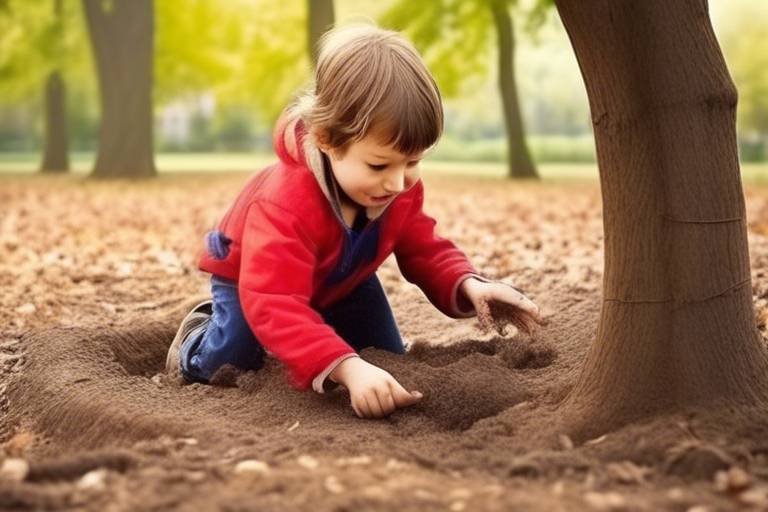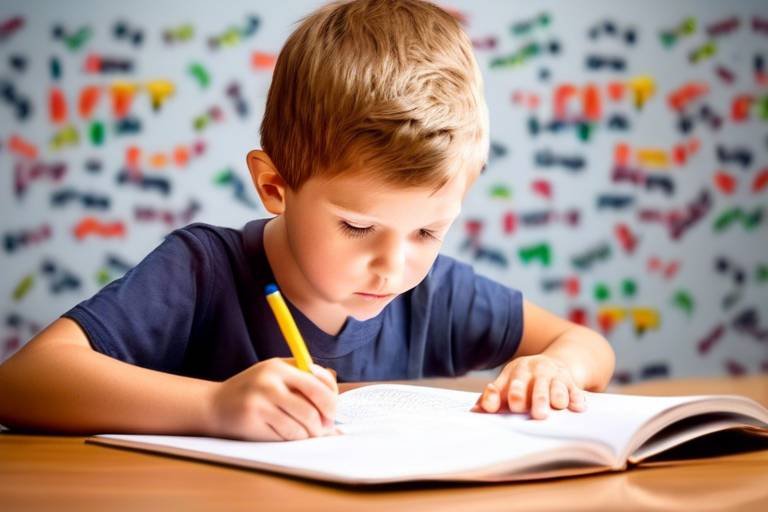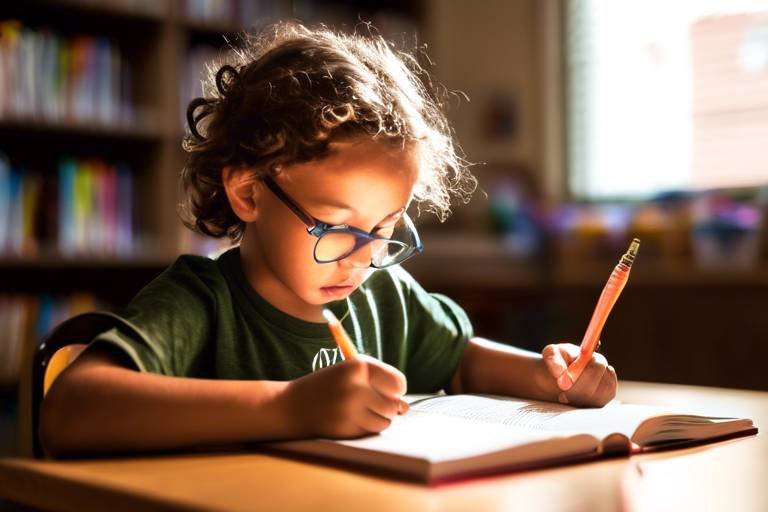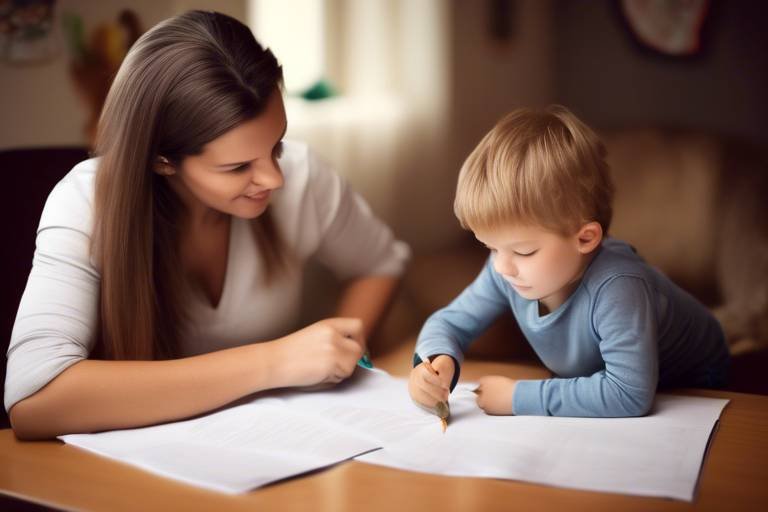The Importance Of Outdoor Play For Children's Development
In today's fast-paced digital world, where screens dominate much of children's time, outdoor play emerges as a crucial element for their development. Imagine a child running freely in a park, laughter echoing as they climb trees and chase friends. This vivid scene is not just about fun; it's a vital part of growing up! Outdoor play is essential for children's physical, emotional, and social development, and it’s high time we recognize its importance. So, why should we prioritize outdoor play in our children's daily routines? Let’s dive into the myriad benefits that outdoor play offers.
Engaging in outdoor activities significantly enhances children's physical health, promoting fitness, coordination, and motor skills. When children play outside, they engage in activities that naturally improve their cardiovascular health, strengthen their muscles, and enhance their overall physical capabilities. Whether it's running, jumping, or climbing, every movement contributes to their growth. Studies show that children who regularly partake in outdoor play are less likely to become overweight and are more likely to develop healthy habits that last a lifetime. Think of it as planting seeds of health that will bloom into a vibrant lifestyle.
Outdoor play provides children with opportunities to express emotions and build resilience. When kids are outside, they are free to explore their feelings, whether it’s joy from a game of tag or frustration when they can't reach the top of a climbing structure. These experiences contribute to their emotional intelligence and overall well-being. Through outdoor play, children learn to navigate their emotions, helping them develop coping strategies for life's challenges. Just like a tree bending in the wind, they learn to be flexible and strong in the face of adversity.
Outdoor activities encourage children to take risks and face challenges, fostering self-esteem and confidence. When a child successfully climbs a tree or conquers a challenging obstacle course, they experience a rush of accomplishment. This sense of achievement is vital for their psychological development. It’s as if they’re building a fortress of confidence, brick by brick, each successful endeavor reinforcing their belief in themselves. The more they play, the more they learn that they can overcome obstacles, both big and small.
Playing outdoors often involves group activities that enhance social skills. When children engage in games like soccer or hide-and-seek, they are not just playing; they are learning the art of teamwork and cooperation. These shared outdoor experiences teach them how to communicate effectively, share resources, and work towards a common goal. Just like a well-oiled machine, each child plays a part in the success of the group, fostering a sense of belonging and camaraderie.
Outdoor play encourages children to think critically and solve problems creatively. In unstructured play environments, children are often faced with challenges that require innovative solutions. For instance, if a group of kids wants to build a fort, they must collaborate and brainstorm ideas, utilizing their creativity and critical thinking skills. This kind of play is essential for cognitive development, as it mimics real-life scenarios where problem-solving is key. It’s like a puzzle that they must piece together, enhancing their ability to think outside the box.
Spending time outdoors fosters a connection with nature, promoting environmental awareness. When children play outside, they are not just having fun; they are also learning about the world around them. They observe the changing seasons, understand the importance of biodiversity, and develop a sense of responsibility towards the environment. This connection is crucial as it lays the groundwork for future generations to appreciate and protect our planet. It's like planting a tree of knowledge that will grow and flourish over time.
Outdoor play provides a platform for children to interact and build relationships. The playground becomes a melting pot of social experiences, where friendships are formed and interpersonal skills are honed. Children learn to navigate the complexities of social interactions, from sharing toys to negotiating play rules. These experiences are crucial for developing the social skills they will carry into adulthood, much like a rehearsal for the grand stage of life.
Playing outside often involves disagreements, offering children opportunities to learn conflict resolution. When children argue over whose turn it is on the swings or how to play a game, they are presented with a chance to learn valuable negotiation skills. Through outdoor play, they discover the importance of compromise and communication, learning that it’s okay to disagree as long as they find a way to resolve it amicably. It's like a dance, where each step brings them closer to understanding and collaboration.
Outdoor environments facilitate the formation of friendships through shared experiences. When children play together, they create memories that bond them, fostering lasting connections among peers. These friendships provide a support system that is invaluable as they navigate the ups and downs of childhood. Just like a garden, these relationships need nurturing and care, and outdoor play is the sunlight that helps them thrive.
- Why is outdoor play important for children?
Outdoor play is crucial for children's physical, emotional, and social development, helping them stay active and connected to nature. - How can parents encourage outdoor play?
Parents can encourage outdoor play by providing safe spaces, organizing playdates, and limiting screen time. - What types of outdoor activities are best for children?
Activities like climbing, running, playing sports, and exploring nature are excellent for children's development.

Physical Benefits of Outdoor Play
Engaging in outdoor activities is not just a fun way for children to spend their time; it is a crucial component of their physical health and overall development. When kids play outside, they are moving, running, jumping, and exploring, all of which contribute to their fitness levels. In today’s digital age, where screens often dominate children’s attention, outdoor play acts as a refreshing antidote. It promotes a more active lifestyle, helping combat issues like obesity and sedentary behavior that are increasingly prevalent.
One of the remarkable aspects of outdoor play is how it enhances coordination and motor skills. Whether they are climbing trees, riding bikes, or playing tag, children are constantly developing their physical abilities. These activities require balance, agility, and strength, all of which are essential for their growth. For instance, climbing on playground equipment not only builds physical strength but also improves hand-eye coordination and spatial awareness. It's like a mini workout that kids don’t even realize they’re doing!
Moreover, outdoor play fosters a sense of freedom and adventure. When children are outside, they have the opportunity to explore their environment in ways that structured indoor activities can't provide. This exploration is vital for their development, as it encourages curiosity and a desire to learn. Think of it as a natural classroom where the lessons are endless, and the experiences are rich. From discovering new insects to understanding the weather patterns, every moment spent outdoors is a chance to learn something new.
Additionally, outdoor play can significantly improve a child's cardiovascular health. Activities like running, jumping, and playing sports increase heart rates and enhance circulation, ultimately leading to a healthier heart. In fact, studies have shown that children who engage in regular outdoor play are less likely to experience health issues later in life. The table below summarizes some of the key physical benefits of outdoor play:
| Benefit | Description |
|---|---|
| Improved Fitness | Encourages regular physical activity, reducing the risk of obesity. |
| Enhanced Coordination | Activities that require balance and agility improve motor skills. |
| Cardiovascular Health | Increases heart rate and promotes better circulation. |
| Social Interaction | Facilitates teamwork and cooperation through group play. |
In conclusion, the physical benefits of outdoor play are undeniable. It not only helps children develop essential motor skills and fitness but also instills a love for nature and an active lifestyle. It’s an investment in their health that pays off in countless ways. So, the next time you’re tempted to let your kids play indoors, remember that the great outdoors is calling! Why not take a break from screens and let them run wild? Their bodies and minds will thank you for it!

Emotional Development Through Outdoor Play
Outdoor play is not just about running around and having fun; it plays a crucial role in the emotional development of children. When children engage in outdoor activities, they are given a unique opportunity to express their emotions freely and interact with their peers in a dynamic environment. This kind of play acts as a natural outlet for their feelings, allowing them to experience joy, frustration, excitement, and even sadness in a safe setting. Imagine a child climbing a tree or building a fort with friends; these experiences are not only thrilling but also serve as a canvas for emotional exploration.
One of the most significant aspects of outdoor play is its ability to foster resilience. When children face challenges outdoors, whether it's learning to ride a bike or navigating a tricky obstacle course, they learn to cope with setbacks. Each fall or stumble becomes a lesson in persistence. They realize that it's okay to fail and that success comes from trying again. This process of overcoming obstacles builds a strong foundation for emotional intelligence, teaching them how to manage their feelings and respond to challenges in life.
Additionally, outdoor play encourages children to develop their self-regulation skills. In unstructured play settings, they must learn to control their impulses and emotions, especially when interacting with others. For instance, when playing a game, they might have to wait for their turn or negotiate rules with friends. These moments are invaluable for teaching patience and understanding, which are essential components of emotional maturity.
Moreover, outdoor play provides a sense of freedom that is often absent in structured environments. This freedom allows children to make choices, take risks, and explore their boundaries. It’s like giving them the keys to a treasure chest filled with opportunities for growth. They learn to trust their instincts and make decisions, which significantly boosts their self-esteem and confidence. When they feel capable and independent, their emotional well-being flourishes.
Engaging in outdoor activities can dramatically enhance a child's self-esteem. When they conquer a challenging climb or successfully organize a game, they experience a sense of achievement that reinforces their belief in their abilities. This is where the magic happens! Each small victory becomes a stepping stone, building their confidence and encouraging them to tackle new challenges. It’s like planting seeds of courage that grow into a robust tree of self-assuredness.
Another emotional benefit of outdoor play is the social interaction it fosters. Children learn to work together, share, and communicate effectively with their peers. These interactions are crucial for developing empathy and understanding others' feelings. When they play team sports or collaborate on building a fort, they practice teamwork and cooperation, which are essential skills for emotional and social development.
Outdoor play is often unstructured, allowing children to engage in creative problem-solving. Whether they are figuring out how to cross a stream using stones or deciding how to share toys, these moments challenge them to think critically and come up with innovative solutions. This kind of play nurtures their cognitive abilities while simultaneously boosting their emotional resilience. It’s like giving them a toolkit filled with strategies to tackle life's challenges.
Lastly, spending time outdoors fosters a deep connection with nature, which has profound emotional benefits. Nature has a calming effect, reducing stress and anxiety levels in children. When they play outside, they are not just having fun; they are also developing a sense of belonging and appreciation for the world around them. This connection promotes environmental awareness and instills values of stewardship, which are vital for their overall emotional and psychological well-being.
- Why is outdoor play important for emotional development? Outdoor play provides children with opportunities to express their emotions, build resilience, and develop self-regulation skills.
- How does outdoor play enhance self-esteem? Engaging in challenging outdoor activities gives children a sense of achievement, boosting their confidence and belief in their abilities.
- Can outdoor play improve social skills? Yes! Outdoor play encourages teamwork and cooperation, helping children develop essential social skills and empathy.
- What role does nature play in emotional development? Nature has a calming effect and fosters a sense of connection, which can reduce stress and enhance overall emotional well-being.

Building Self-Esteem and Confidence
When children engage in outdoor activities, they are not just having fun; they are embarking on a journey that significantly boosts their self-esteem and confidence. Imagine a child climbing a tree for the first time. As they reach the top, the thrill of achievement surges through them, and in that moment, they learn that they can conquer challenges. This simple act of climbing is more than just a physical feat; it’s a powerful lesson in self-efficacy—the belief in their own abilities.
Outdoor play is inherently filled with risks and challenges, which are essential for a child's development. When children take part in activities like biking, climbing, or even playing tag, they are constantly pushing their limits. Each small victory, whether it's mastering a new skill or overcoming a fear, contributes to a growing sense of accomplishment. This accumulation of experiences helps them develop a positive self-image. For instance, when a child learns to ride a bike without training wheels, their pride in this achievement can translate into a greater willingness to tackle other challenges in life.
Moreover, outdoor play often involves a social component. Children are more likely to engage in group activities that require teamwork and collaboration. This interaction fosters a sense of belonging and acceptance, which is crucial for building confidence. When children work together to build a fort or play a game, they learn to communicate, share, and support one another. These experiences not only enhance their social skills but also reinforce their self-worth as they realize they are valued members of a team.
In addition to these benefits, outdoor play provides children with opportunities to explore their interests and passions. Whether it’s discovering a love for nature through hiking or developing athletic skills through sports, these pursuits help children cultivate a sense of identity. As they engage in activities they enjoy, they begin to see themselves as competent and capable individuals. This self-discovery is vital for nurturing a strong sense of confidence that will carry them through various stages of life.
To illustrate the impact of outdoor play on self-esteem, consider the following table that summarizes key benefits:
| Benefit | Description |
|---|---|
| Risk-Taking | Encourages children to step out of their comfort zones, leading to personal growth. |
| Social Interaction | Promotes teamwork and communication skills through collaborative play. |
| Skill Mastery | Helps children gain confidence as they learn and master new skills. |
| Identity Formation | Allows children to explore interests, fostering a sense of self. |
In conclusion, outdoor play is a vital ingredient in the recipe for building self-esteem and confidence in children. By encouraging them to take risks, engage socially, and explore their interests, we are equipping them with the tools they need to navigate life’s challenges. So, the next time you see a child playing outside, remember that they are not just having fun—they are building the foundation for a confident and resilient future.
- Why is outdoor play important for children? Outdoor play promotes physical health, emotional well-being, and social skills development.
- How can parents encourage outdoor play? Parents can set aside time for outdoor activities, provide safe play environments, and participate in play with their children.
- What types of outdoor activities are best for building confidence? Activities that involve challenges, such as climbing, team sports, or obstacle courses, are great for boosting confidence.
- How does outdoor play affect social skills? Outdoor play encourages children to interact, negotiate, and cooperate with peers, enhancing their social skills.

Social Interaction and Teamwork
When children play outdoors, they are not just having fun; they are also engaging in a vital learning process that enhances their social interaction and teamwork skills. Imagine a group of kids playing a game of tag in a sprawling park. Each child must communicate, strategize, and react to the others' movements. This dynamic environment fosters collaboration and teaches them the importance of working together towards a common goal. The laughter and excitement that fill the air are not just sounds of joy; they are the building blocks of essential social skills.
Outdoor play provides numerous opportunities for kids to engage in group activities, whether it's playing sports, building a fort, or simply exploring the neighborhood. Through these activities, children learn to share, take turns, and respect one another's space and ideas. For example, when they are involved in team sports, they quickly learn that success is not just about individual talent but about how well they can work together as a cohesive unit. This realization can be a powerful lesson in the value of teamwork, often translating into better relationships both on and off the playground.
Moreover, outdoor play encourages children to develop effective communication skills. They learn how to express their thoughts and feelings, negotiate rules, and resolve conflicts in real time. These interactions can lead to deeper friendships and a greater understanding of social dynamics. For instance, when a disagreement arises during a game, children must navigate their emotions and find a way to compromise, which is an invaluable life skill.
To illustrate the impact of outdoor play on social interaction and teamwork, consider the following table that outlines key benefits:
| Benefit | Description |
|---|---|
| Enhanced Communication | Children learn to articulate their thoughts and understand others through play. |
| Conflict Resolution | Outdoor play provides scenarios for children to practice negotiating and resolving disagreements. |
| Building Trust | Team activities help children develop trust in their peers, fostering a supportive environment. |
| Empathy Development | Through shared experiences, children learn to understand and relate to the feelings of others. |
In conclusion, the social interaction and teamwork skills that children develop through outdoor play are crucial for their overall development. These experiences not only prepare them for future social situations but also enhance their ability to form lasting relationships. So, the next time you see children playing outside, remember that they are not just having fun; they are also building the foundations for their social lives.
- Why is outdoor play important for children's development? Outdoor play is essential as it promotes physical health, emotional well-being, and social skills, providing a holistic approach to a child's growth.
- How can parents encourage outdoor play? Parents can encourage outdoor play by providing safe, engaging environments, organizing playdates, and participating in outdoor activities with their children.
- What types of outdoor activities are best for social development? Activities that involve teamwork, such as sports, group games, and collaborative projects, are excellent for enhancing social skills.
- Can outdoor play help with conflict resolution? Yes, outdoor play often involves disagreements, allowing children to practice negotiation and compromise in a real-world context.

Creative Problem Solving
Outdoor play is not just about running around and having fun; it’s a treasure trove for developing creative problem-solving skills. When children engage in unstructured play, they are often faced with challenges that require them to think on their feet. Imagine a group of kids building a fort out of sticks and leaves. They quickly realize that some sticks are too short, while others are too flimsy. This situation sparks a flurry of ideas and brainstorming sessions among them, as they collaborate to find solutions. This is where the magic happens!
Through these playful interactions, children learn to assess their environment, identify problems, and devise strategies to overcome obstacles. For instance, when a child encounters a muddy patch while playing tag, they might come up with innovative ways to navigate around it, perhaps by finding a path through the grass or even creating a new game that incorporates the mud. This kind of thinking not only boosts their creativity but also enhances their critical thinking skills.
Moreover, outdoor play often involves elements of risk and uncertainty. When children climb a tree or navigate a rocky path, they must evaluate their own abilities and make decisions based on their judgment. This process is crucial for developing resilience and adaptability. They learn that failing to climb a branch doesn’t mean they should give up; instead, it’s an opportunity to try different approaches or seek help from friends. In this way, outdoor play becomes a laboratory for testing ideas and refining them through trial and error.
Additionally, the social aspect of outdoor play fosters collaboration among peers. When children work together to solve a problem, they engage in discussions that encourage them to express their thoughts and listen to others. This exchange of ideas can lead to unexpected solutions that a single child might not have considered. For example, while attempting to build a makeshift bridge over a small stream, one child might suggest using a fallen log, while another might propose weaving grass and twigs together. These collaborative efforts not only enhance their problem-solving skills but also teach them the value of teamwork and communication.
In conclusion, the benefits of outdoor play extend far beyond physical activity. It is a critical component of child development that nurtures creative problem-solving skills. By engaging with their environment and collaborating with peers, children learn to think critically, adapt to challenges, and approach problems with a sense of curiosity. So, the next time you see kids playing outside, remember that they are not just having fun; they are also becoming innovative thinkers ready to tackle the challenges of the future!
- Why is outdoor play essential for children's development?
Outdoor play promotes physical health, emotional resilience, and social skills, making it a vital part of a child's growth. - How does outdoor play enhance creativity?
Children face real-world challenges during outdoor play, which encourages them to think creatively and develop innovative solutions. - What types of activities are best for outdoor play?
Activities like climbing, building, and team sports are excellent for promoting engagement and problem-solving skills. - How can parents encourage outdoor play?
Parents can facilitate outdoor play by providing safe spaces, organizing playdates, and participating in outdoor activities with their children.

Connection with Nature
In today's fast-paced, technology-driven world, it's easy for children to become disconnected from nature. However, fostering a is crucial for their holistic development. When children engage in outdoor play, they not only have fun but also develop a profound appreciation for the environment around them. Imagine a child running through a field, feeling the grass under their feet, or climbing a tree and observing the world from a new height. These experiences are not just play; they are essential for nurturing a sense of wonder and curiosity about the natural world.
Research has shown that spending time in nature can have remarkable benefits for children. It enhances their creativity, reduces stress, and improves their overall mood. When children are outdoors, they are more likely to engage in imaginative play, transforming a simple stick into a sword or a fallen log into a pirate ship. Such experiences foster creativity and allow children to express themselves freely, away from the constraints of indoor environments.
Furthermore, being in nature can instill a sense of responsibility and stewardship in children. As they explore their surroundings, they learn about the importance of protecting the environment. For example, they might notice litter on a trail and feel compelled to pick it up, or they may become curious about local wildlife and how to protect their habitats. This connection not only benefits the children but also promotes a healthier planet for future generations.
To illustrate the benefits of connecting with nature, consider the following table that highlights key advantages:
| Benefits of Nature Connection | Description |
|---|---|
| Enhanced Creativity | Outdoor play encourages imaginative scenarios and creative thinking. |
| Improved Mood | Exposure to nature has been linked to reduced anxiety and improved emotional well-being. |
| Environmental Awareness | Children learn about ecosystems and the importance of conservation. |
| Physical Health | Outdoor activities promote physical fitness and overall health. |
Ultimately, the connection with nature is about more than just play; it's about cultivating a lifelong relationship with the environment. By encouraging outdoor play, parents and educators can help children develop a sense of belonging to the world around them. This connection not only enriches their childhood experiences but also lays the groundwork for them to become responsible, caring adults who value and protect the natural world.
- Why is outdoor play important for children?
Outdoor play is essential for children's physical, emotional, and social development. It promotes fitness, boosts creativity, and enhances social skills.
- How can I encourage my child to play outside more?
Set up playdates, create outdoor games, or explore local parks together. Make outdoor time a regular part of your routine.
- What are some safe outdoor activities for children?
Activities like hiking, biking, playing tag, or even gardening can be safe and enjoyable options for children.

Social Skills Development
Outdoor play is not just about running around and having fun; it serves as a crucial platform for children to develop essential social skills. When kids engage in play outside, they are often involved in activities that require them to interact with their peers, negotiate rules, and collaborate to achieve common goals. This kind of interaction is vital for their social growth and helps them understand the dynamics of relationships.
Imagine a group of children playing a game of tag. In this lively scenario, they must communicate effectively to understand the rules, decide who will be "it," and agree on boundaries. These interactions are rich with opportunities for children to practice important social skills such as sharing, taking turns, and resolving conflicts. The outdoor environment allows them to express themselves freely, which is essential for building confidence in their social abilities.
Moreover, outdoor play often involves teamwork. Children learn to work together to accomplish tasks, whether it’s building a fort, playing soccer, or organizing a scavenger hunt. This collaborative spirit not only fosters a sense of community but also teaches them about responsibility and the importance of supporting one another. They learn that everyone has a role to play, and their contributions matter.
Another significant aspect of outdoor play is the development of conflict resolution skills. Disagreements are bound to happen during play, whether it's about the rules of a game or a dispute over a toy. When children are faced with these challenges, they have the opportunity to practice negotiation and compromise. For instance, if two kids want to be the leader in a game, they must discuss and decide how to share that role. This not only helps them learn to manage their emotions but also prepares them for future social interactions where conflict resolution is essential.
In addition to conflict resolution, outdoor play is a breeding ground for friendship formation. Shared experiences, such as playing a game or exploring a park, create bonds between children. These moments of joy and teamwork lay the foundation for lasting friendships. As they navigate the ups and downs of play, children learn to empathize with one another, which is a cornerstone of strong relationships.
To summarize, outdoor play is a vital contributor to the development of social skills in children. It provides them with the tools they need to interact with others, resolve conflicts, and form friendships. By encouraging outdoor play, we are not just promoting physical activity; we are also fostering a generation of socially adept individuals who can thrive in various social settings.
- Why is outdoor play important for social skills?
Outdoor play allows children to interact with peers, negotiate rules, and work together, all of which are essential for developing social skills. - How does outdoor play help with conflict resolution?
When disagreements arise during play, children learn to negotiate and compromise, which teaches them how to resolve conflicts effectively. - Can outdoor play lead to lasting friendships?
Yes! Shared experiences in outdoor settings help children bond and form friendships that can last a lifetime.

Conflict Resolution Skills
When children play outdoors, they often find themselves in situations where disagreements arise. Whether it's over the rules of a game, the choice of play equipment, or even just sharing space, these moments can be pivotal for learning essential . Think of it as a mini-laboratory for social interaction, where children experiment with different ways to handle disputes. In this dynamic environment, they learn that disagreements are a natural part of relationships and that how they navigate these conflicts can significantly impact their friendships.
Outdoor play provides a rich tapestry of experiences where children can practice negotiation and compromise. For instance, when two kids want to play on the same swing, they might have to talk it out, propose a time-sharing solution, or even come up with a completely new game that includes both of their ideas. This process not only teaches them about fairness but also about empathy—understanding each other's feelings and perspectives. By engaging in these discussions, children learn that it's okay to express their feelings and that listening to others is just as important.
Moreover, the outdoor setting often encourages a sense of adventure and spontaneity, which can lead to unexpected conflicts. Imagine a group of children building a fort out of sticks and leaves only to disagree on its design. This scenario presents a fantastic opportunity for them to brainstorm together, weigh different opinions, and come to a consensus. Here, they are not just resolving a conflict; they are also honing their creative problem-solving skills. They learn that multiple solutions can exist for a single problem, which is a valuable lesson that extends far beyond the playground.
In essence, the conflicts that arise during outdoor play are not merely obstacles; they are stepping stones towards developing strong interpersonal skills. As children learn to navigate these challenges, they build resilience and adaptability, qualities that will serve them well throughout their lives. The playground becomes a classroom, teaching lessons that are not found in textbooks but are crucial for emotional intelligence and social competence.
To encapsulate the importance of conflict resolution skills gained through outdoor play, consider the following table that outlines the key benefits:
| Skill Developed | How It Is Learned | Long-Term Benefits |
|---|---|---|
| Negotiation | Through discussions and compromises in games | Better interpersonal relationships |
| Empathy | Understanding different perspectives during conflicts | Enhanced emotional intelligence |
| Creative Problem Solving | Finding solutions to disagreements in play | Improved critical thinking skills |
| Resilience | Learning to cope with setbacks in games | Greater adaptability in life challenges |
In conclusion, the outdoor play environment is a breeding ground for conflict resolution skills that are vital for children's development. By engaging in these experiences, children not only learn how to resolve conflicts but also build a toolkit of social skills that will benefit them throughout their lives.
- Why is outdoor play important for conflict resolution?
Outdoor play provides real-life scenarios where children can practice resolving disagreements, helping them develop essential social skills. - How can parents encourage outdoor play?
Parents can encourage outdoor play by organizing playdates, providing access to parks, and allowing children to explore their surroundings freely. - What are some common conflicts children face during play?
Common conflicts include sharing toys, differing opinions on game rules, and disputes over space or equipment. - How can children learn empathy through outdoor play?
By engaging in discussions during conflicts, children learn to understand and appreciate different perspectives, fostering empathy.

Friendship Formation
Outdoor play is not just about physical activity; it's a vibrant playground for . When children engage in outdoor games, they naturally gravitate towards one another, forming connections that can last a lifetime. Think about it: when kids are outside, they’re not just running around; they’re sharing laughter, negotiating rules, and creating memories. These shared experiences are the building blocks of friendships.
Imagine two kids climbing a tree together. As they help each other reach the highest branch, they’re not only building their physical skills but also forging a bond based on trust and collaboration. This kind of interaction is crucial because it teaches children how to work together towards a common goal. The joy of achieving something together—like reaching the top of that tree—creates a sense of camaraderie that is hard to replicate in a structured indoor environment.
Moreover, outdoor play often involves a mix of children from different backgrounds, which enhances their social exposure. When kids play together outside, they learn to appreciate diversity, developing friendships that might not have formed within the confines of a classroom. This exposure is essential in today’s multicultural world, where understanding and empathy are key to building strong relationships.
Children also learn valuable social skills through outdoor play. For instance, when they engage in team sports or group games, they practice essential skills such as communication, cooperation, and empathy. These skills are not just beneficial for forming friendships; they are fundamental for navigating social situations throughout life. By playing together, children learn to express their feelings, understand others' perspectives, and even resolve conflicts—skills that are vital for maintaining long-lasting friendships.
In addition, the nature of outdoor play often involves a degree of unpredictability and excitement, which can enhance friendships. The thrill of a spontaneous game of tag or the adventure of exploring a new park can create a unique bond between children. They share moments of joy, surprise, and even the occasional mishap, which can lead to inside jokes and shared stories that strengthen their connection.
To sum it up, outdoor play is a fertile ground for friendship formation. It's where children learn to connect, communicate, and collaborate. As they navigate the ups and downs of play, they develop relationships that not only enrich their childhood experience but also lay the foundation for their social skills in adulthood. So, let’s encourage our children to step outside and play, because every game is an opportunity for friendship!
- Why is outdoor play important for children's development? Outdoor play fosters physical health, emotional well-being, and social skills, making it vital for holistic development.
- How can I encourage my child to play outside more often? Set aside specific times for outdoor activities, join them in play, and limit screen time to motivate them to explore the outdoors.
- What types of outdoor activities are best for building friendships? Group games, team sports, and cooperative activities like scavenger hunts can be great for encouraging social interaction.
Frequently Asked Questions
- Why is outdoor play important for children's physical health?
Outdoor play is crucial for children's physical health as it promotes fitness, coordination, and the development of motor skills. Engaging in activities like running, jumping, and climbing helps children build strength and endurance, laying the foundation for a healthier lifestyle.
- How does outdoor play contribute to emotional development?
Outdoor play allows children to express their emotions freely and face challenges, which builds resilience. Through these experiences, they learn to manage feelings, enhancing their emotional intelligence and overall well-being.
- In what ways does outdoor play help build self-esteem?
When children participate in adventurous outdoor activities, they take risks and face new challenges. Successfully overcoming these obstacles boosts their self-esteem and confidence, making them more willing to tackle future challenges.
- Can outdoor play improve social skills?
Absolutely! Outdoor play often involves group activities that require teamwork and cooperation. These interactions help children develop essential social skills, such as communication and empathy, which are vital for building relationships.
- What role does outdoor play have in friendship formation?
Outdoor environments create opportunities for children to bond over shared experiences. Playing together fosters connections, helping them form lasting friendships through teamwork and common goals.
- How does outdoor play encourage creative problem-solving?
Outdoor play often presents children with unstructured environments where they must think critically and solve problems on their own. This type of play encourages creativity, as they learn to navigate challenges in innovative ways.
- Why is a connection with nature important for children?
Spending time outdoors fosters a deep connection with nature, which is essential for developing environmental awareness. This connection helps children appreciate the natural world and understand their role in preserving it.
- How do children learn conflict resolution through outdoor play?
Outdoor play often involves disagreements among peers, providing a natural setting for children to learn conflict resolution skills. They practice negotiation and compromise, which are crucial for navigating social situations throughout their lives.



















